Imagine if you could understand the Book of Revelation better. What if you could make sense of the four horsemen of the apocalypse, the beast that rises out of the sea, and the 1,000-year millennial reign of Jesus Christ?
You would know Scripture better, mature in your faith, and know God more. Bible commentaries on Revelation can help you understand and apply the book’s message to your life.
The Bible instructs Christians to seek wisdom (Prov. 1:7, James 1:5), and who better to learn from than pastors, theologians, and professors who have been studying and teaching Revelation for decades?
10 Best Revelation Commentaries
The best Revelation commentaries are listed below. The recommendations include commentaries for every reading level and purpose, including individual Bible study, small groups, Sunday school, preaching, and teaching. The “Top 10” list is based on aggregate reviews.
Readers are encouraged not to use commentaries to replace prayer, the Holy Spirit, and the individual’s diligent study of Scripture. Nevertheless, a list based on aggregate reviews will likely point you in the right direction to find the right resource for your purposes.
Please use the list below as a starting point for learning about commentaries on Revelation. It’s not intended as the “final word” on the topic but merely a “helpful word.”
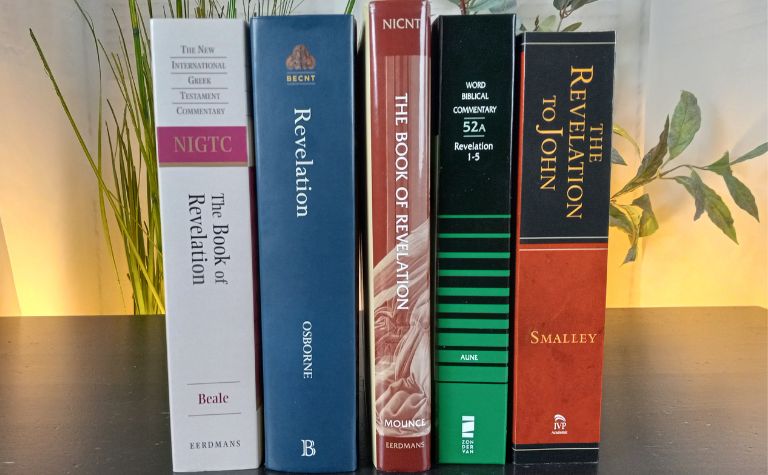
#1: The Book of Revelation by G.K. Beale (NIGTC)
G.K. Beale is an evangelical biblical scholar and theologian. He is known for his expertise in the New Testament’s use of the Old Testament, biblical theology, and Revelation. Beale is ordained in the Orthodox Presbyterian Church and a professor at Westminster Theological Seminary.
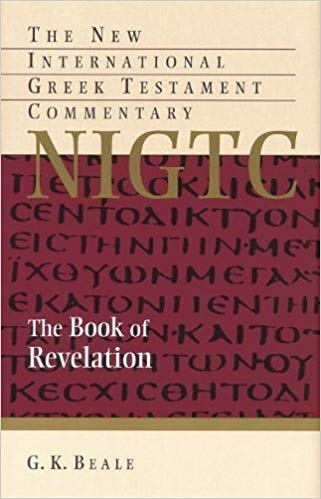
The Best-Reviewed Amillennial Commentary on Revelation
Beale’s Revelation volume in the New International Greek Testament Commentary series is the best-reviewed commentary on the Bible’s last book. The volume is technical as Beale provides in-depth discussions of Greek and interacts extensively with non-biblical literature.
Readers who want the fruit of Beale’s work without the technical detail should consider Revelation: A Shorter Commentary (link goes to Amazon). There is no Greek in the abridged edition. It’s also about one-third of the price as the unabridged technical volume.
Beale describes his approach to Revelation as an “eclectic redemptive-historical idealist view” and “a redemptive-historical form of modified idealism.” (p. 48) He is Amillennial. Beale writes: “… no specific prophesied historical events are discerned in [Revelation], except for the final coming of Christ.” (p. 48)
Beale is more technical than Osborne (#2 below) and Mounce (#3 below), both premillennial. A more accessible Amillennial option is Beale’s abridged volume, Smalley (#5 below) or Johnson (#9 below).
| Reviews from Journals and Pastors |
| Journal for Biblical Literature |
| “While the reader may not necessarily agree on all points, the commentary will certainly provide considerable insight into John’s often perplexing vision… Beale’s grasp of the Greek grammar is outstanding” |
| Journal of the Evangelical Theology Society |
| “I do not believe that it is an overstatement to assert that G.K. Beale is the most qualified evangelical to comment on Revelation in this generation.” |
| D.A. Carson |
| “for students and well-trained pastors… combines comprehensiveness with biblical fidelity, exegesis with theology, and literary sensitivity with historical awareness” |
Please also see Best Commentary Series: The Top 50. Based on aggregate reviews.
#2: Revelation by Grant R. Osborne (BECNT)
Grant R. Osborne (1942-2018) was a prominent evangelical biblical scholar and professor. He significantly contributed to New Testament studies, hermeneutics, and biblical theology.
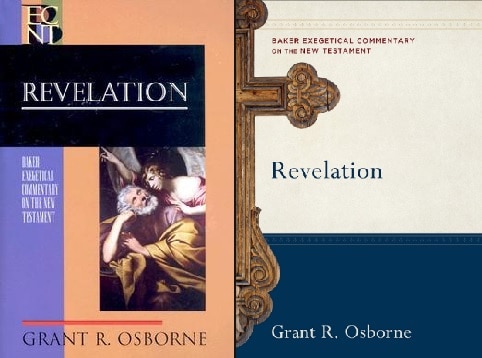
The Best-Reviewed Dispensational Premillennial Revelation Commentary
Osborne’s Revelation commentary reflects premillennialism. The presentation is mid-level. It helps to know Greek, but it’s not necessary.
Osborne’s approach to Revelation is premillennial yet eclectic. He writes, “the futurist rather than the idealist position is primary” in this volume (p. 22). He adds, “I take the premillennial approach but recognize the viability” of other positions (p. 697).
Osborne was Arminian. He taught at Trinity Evangelical Divinity School. Osborne is well-known for his Matthew volume in the ZECNT series, considered one of the best Matthew commentaries.
Readers often find Osborne more accessible than Beale (#1 above) and less accessible than Mounce (#3 below). Robert Thomas (#8 below) is the most like Osborne. Alan Johnson (#10 below) is best for an introductory-level premillennial commentary.
After browsing the commentaries below, see the best one-volume bible commentaries, based on aggregate reviews.
#3: The Book of Revelation by Robert H. Mounce (NICNT)
Robert H. Mounce (1921-2019) was a distinguished biblical scholar and translator. He was primarily known for his work on biblical translation, particularly his contribution to the English Standard Version (ESV) and the New International Version (NIV).
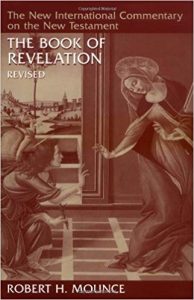
The Best-Reviewed Historical Premillennialism Revelation Commentary
Many pastors prefer Mounce over Beale and Osborne, though his discussion of biblical scholarship is now dated. Yet, it has few rivals for explaining the meaning of the text.
Mounce holds to historical premillennialism. Yet readers have noted that some of his interpretations about the millennium are unique. One academic review notes, “His discussion of the millennium in general has a number of turns many premillennialists cannot easily figure…” [2]
For example, Mounce suggests a partially eclectic approach: “[John] could without contradiction be preterist, historicist, futurist, and idealist” (p. 29). Yet elsewhere, he says, “John taught a literal millennium, but its essential meaning may be realized in something other than a temporal fulfillment” (p. 359).
Mounce taught at Baptist and Presbyterian colleges. Mounce was an NIV, NLT, and ESV translation team member. He is known for his Romans volume in the NAC series, considered one of the best Romans commentaries.
| Reviews from Journals and Pastors |
| Logia |
| “It avoids many of the dangerous pitfalls of some exegesis of Revelation, particularly the speculative identification of descriptions in Revelation with specific modern events and people…” |
| Journal of Biblical Literature |
| “his readers and colleagues can be grateful for Mounce’s rare gift of taking the opinions of others as seriously as he takes his own.” |
| D.A. Carson |
| “a learned and well-written work that not only explains the text satisfactorily in most instances but also introduces the student to the best of the secondary literature” |
#4: Revelation (3 vol.) by David E. Aune (WBC)
David E. Aune is a prominent biblical scholar and professor. He is best known for his expertise in New Testament studies, particularly the book of Revelation, early Christian literature, and the study of apocalyptic literature.
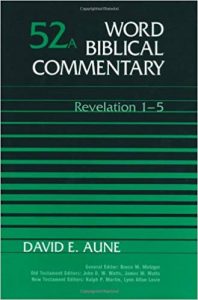
The Best-Reviewed Preterist Revelation Commentary
Bible scholars are the primary audience for this commentary. These volumes include extensive discussions on modern biblical scholarship, for which they are well-reviewed. Less space is devoted to theology and application.
Regarding the theology of Revelation, Aune’s view is preterist. Those looking for an Amillennial or premillennial interpretation will want to consider another resource.
Aune takes a moderately critical approach to Revelation in his discussions on textual criticism. He is a member of the Evangelical Lutheran Church and is an emeritus professor at the University of Notre Dame.
| Reviews from Journals and Pastors |
| Currents in Theology and Mission |
| “One can only admire the industry that Beale and Aune display. It is difficult to choose between them. Both will exhaust the reader long before they exhaust the commentary.” |
| Journal of the Evangelical Theological Society |
| “While Aune evidences very little interest in any sort of standard evangelical theology (e.g., only a fraction of a page given over to the “millennium” issue in Revelation 20 [p. 1089])… I would say that many, if not most, aspects of Aune’s work are unquestionably brilliant.” |
| Keith Mathison (Ligioner ministries) |
| “Aune is very helpful with the details of the text and the details of extrabiblical literature. He is not as helpful when it comes to the point of understanding what the book means, its message, and theology.” |
#5: The Revelation to John by Stephen S. Smalley (Stand Alone)
Stephen S. Smalley (1933-2018) is a renowned biblical scholar and theologian. He specialized in the study of the New Testament, focusing on the Gospel of John and the apostle Paul’s writings.

The Best-Reviewed Critical Commentary on Revelation
Many commentators argue that Revelation was written in the 90s A.D. Yet, Smalley, argues that it was written before 70 A.D. His verse-by-verse exegesis is in-depth. Many readers who desire an Amillennial commentary have found it more accessible than Beale.
Regarding the theology of Revelation, Smalley’s view is Amillennial: “I follow Beale (48-49) in adopting a view which may be best described as a modified idealist.” He holds that Revelation is a symbolic portrayal of the conflict between God and Satan.
Smalley writes that the conflict between God and Satan “involves a final consummation in judgment and salvation” (p. 16). He argues that “the millennium in Rev. 20 is best interpreted as a symbol for the timeless reign of God in Christ, in heaven and on earth” (p. 504).
Smalley takes a critical approach to interpreting Revelation when discussing textual criticism. He is an Anglican scholar and priest.
| Reviews from Journals and Pastors |
| Journal of the Evangelical Theological Society |
| “Smalley presents these materials in a very readable manner. Even though the subtitle of the book reminds the reader that this is a commentary on the Greek text of Revelation, the truth is that this work is easily accessible to those who may not have the necessary background in Greek.” |
| Keith Mathison (Ligioner ministries) |
| #1 ranked commentary on Revelation: “I believe his view of the dating of the book is essentially correct… that the book was written in the reign of Vespasian (AD 69-79), just before the fall of Jerusalem to Titus in AD 70.” |
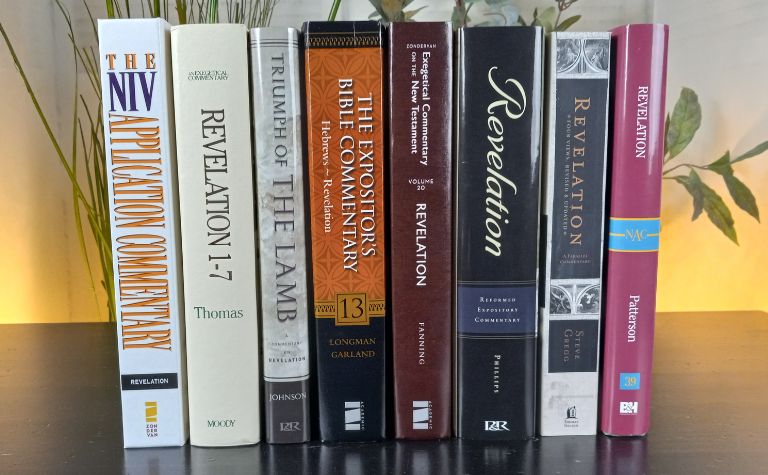
#6: A Commentary on the Revelation of John by G. E. Ladd (Stand Alone)
Gordon Eldon Ladd (1911-1982) was a highly influential biblical scholar and theologian. He specialized in New Testament studies, focusing on the teachings of Jesus, the Kingdom of God, and eschatology. Ladd was a Baptist minister.
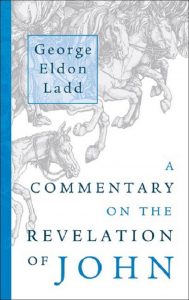
Ladd was a Baptist minister
Ladd’s commentary on Revelation is now considered a classic. It is a mid-level commentary that is well-reviewed for making complex ideas easy to understand. Even reviewers who disagree with his eschatology appreciate his explanations on many aspects of the Apocalypse.
Ladd’s view is historical premillennial concerning the millennium and post-tribulation about the rapture. He believes readers must know how the original audience understood the book: “…we conclude that the correct method of interpreting the Revelation is a blending of the preterist and the futurist methods.”
For example, he says, “the beast is both Rome and the eschatological Antichrist… the great tribulation is primarily an eschatological event, but it includes all tribulation which the church may experience…” (p. 14).
Ladd adds: “The form of premillennialism which sees Revelation as a prophecy of the destiny of the church is not widely held today, but it is the theology expounded in the present commentary” (p. 261).
| Reviews from Journals and Pastors |
| Bibliotheca sacra |
| “[Ladd] supports the premillennial and posttribulational view of the second coming of Christ. Readers will find new insights into this difficult book which climaxes the New Testament, and will profit generally by a careful reading of this commentary. |
| Westminster Theological Journal |
| “Though the reviewer is not a Premillennialist, he joyfully admits that among Premillennialistic commentaries on the book of Revelation—and such commentaries are by no means scarce! — this book could well be the best. The book is full of excellent comments.” |
| Tom Schreiner |
| “a lucid interpretation from the historical premillennial viewpoint” |
#7: Revelation by Craig S. Keener (NIVAC)
Craig S. Keener is a prominent biblical scholar and theologian known for his extensive work in New Testament studies, particularly in the areas of historical Jesus research, the book of Acts, and the cultural backgrounds of the Bible.
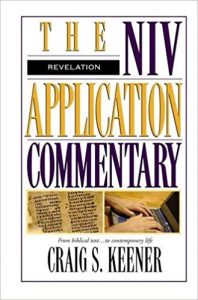
Keener’s Revelation commentary highlights applying the text
Keener’s Revelation commentary is one of the most popular volumes in perhaps today’s most popular series. True to the series’ aim, Keener devotes significant space to making the text of Revelation relevant to the twenty-first century.
Though he doesn’t provide as much exegetical, historical, or literary discussion as some readers desire, many pastors have found the commentary helpful for preaching Revelation, no matter their eschatology.
Keener interprets Revelation within the framework of evangelical theology. He is an Arminian who affiliates with Pentecostal denominations and churches.
Regarding theology, Keener explains, “I am skeptical of a future promise for national Israel that excludes ethnically gentile Christians who have been grafted into Israel’s heritage and hope… at the same time, I cannot think that the Old Testament prophets intended a ‘replacement’ of Israel now unrelated to her historical heritage” (p. 478).
Regarding the theology of Revelation, Keener’s view is historic premillennialism. He rejected dispensational premillennialism as an early Christian (p. 15, 40).
Keener is a prolific author who has written commentaries on several (most?) New Testament books. His two-volume John commentary is considered by many to be one of the best John commentaries.
| Reviews from Journals and Pastors |
| Bibliotheca sacra |
| “[Keener’s] approach is eclectic, interpreting Revelation 19-20 as referring to the Second Coming and the millennium, but blending historicist and futurist views in Revelation 4-18… the seriousness of his applications will not fail to challenge readers…” |
| D.A. Carson |
| “devotes appropriate attention to thoughtful application” |
#8: Revelation (2 vol.) by Robert L. Thomas (Stand Alone)
Robert L. Thomas (1928-2017) was a notable biblical scholar and theologian. He specialized in New Testament studies, Greek language, and textual criticism. Thomas is known for his work as the co-author of the New American Standard Bible (NASB) translation.
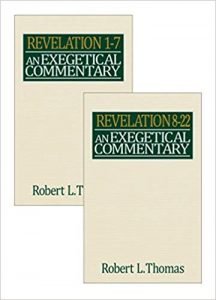
Thomas’ commentary is premillennial
Written in the early to middle 1990s, Thomas’ two-volume Revelation commentary is perhaps the most in-depth exegetical commentary written from the dispensational premillennial perspective. Those who know Greek will maximize this volume.
Thomas interprets Revelation within the framework of evangelical theology. He taught at The Master’s Seminary, which is associated with the ministry of John MacArthur.
Regarding the theology of Revelation, Thomas’ view is premillennial: “In post-Reformation times, detailed commentaries on the Greek text of Revelation from a futurist and premillennial perspective have been scarce and perhaps non-existent.” [This two-volume set] “attempts to fill that void…”
| Reviews from Journals and Pastors |
| The Master’s Seminary Journal |
| “This monumental work results from over thirty years of study; its 1200 plus pages represent the most detailed, exegetically oriented, dispensationally directed commentary on Revelation known to this reviewer.” |
| Bibliotheca sacra |
| “presents a conservative approach to introductory questions. Thomas ably defends the Johannine authorship of Revelation and establishes a date of about A D 95 for the time of its writing… Thomas’s commentary is excellent.” |
| Tom Schreiner |
| “a thorough commentary from the dispensational premillennial viewpoint” |
#9: Triumph of the Lamb by Dennis E. Johnson (Stand Alone)
Dennis E. Johnson is a respected biblical scholar and theologian known for his expertise in the New Testament and Revelation. He has also made significant contributions to biblical theology and pastoral ministry.
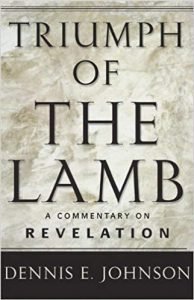
Johnson is Reformed and Amillennial
Like Stephen S. Smalley’s Revelation commentary (#5 above), Johnson wrote a stand-alone exegetical commentary based on the Greek text from an idealist perspective.
He is Reformed and an ordained Presbyterian minister. Johnson taught at Westminster Seminary, California. Regarding the theology of Revelation, Johnson’s view is Amillennial.
He writes: “Having grown up in a church that taught a futurist interpretation of Revelation and having flirted seriously with preterism at a later point, I find idealism most persuasive because idealism offers interpretations that would have been intelligible to John’s first hearers in their context…” (p. 361)
| Reviews from Pastors and Professors |
| D.A. Carson |
| “The strength of this work is the way it takes some of the best material on the interpretation of apocalyptic generally, and Revelation in particular, and presents it in a palatable, readable form.” |
| S. M. Baugh |
| “Johnson writes with masterful skill without losing the reader down exegetical rabbit trails. Triumph of the Lamb is essential reading on Revelation from a man with unique qualifications as a well-loved pastor, New Testament scholar, and now professor of practical theology. This book is itself a triumph.” |
#10: Revelation by Alan F. Johnson (EBCR)
Alan F. Johnson is a respected biblical scholar and theologian known for his contributions to New Testament studies and pastoral ministry. He has focused on studying the books of Romans, 1 Corinthians, and Revelation.
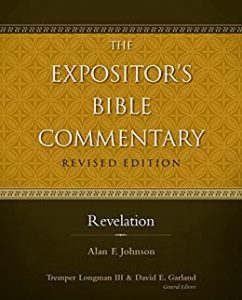
Johnson’s commentary is evangelical
The EBCR series is a favorite among pastors, which has helped to elevate Johnson’s Revelation commentary. It’s a mid-level commentary. Knowledge of Greek isn’t necessary to maximize it.
Johnson offers some theological reflection and application assistance. This volume comes with R.T. France’s well-reviewed Hebrews commentary in the revised hardcopy edition.
Johnson interprets Revelation within the framework of evangelical theology. Regarding the theology of Revelation, Johnson’s view is historic premillennialism.
He writes, “I believe that the preterist’s view, and to a lesser extent the preterist-futurist’s view, is misled. I hold that John is describing the final judgment; the physical, bodily return of Christ to the world; and the future resurrection of believers” (p. 587).
| An Academic Journal Reviews |
| Journal of the Evangelical Theological Society |
| “Johnson has written a thorough, clear, concise, informative, well-balanced and fair commentary… His conclusions, especially on difficult questions, are always judiciously reached and modestly held.” |
10 More Commentaries on the Book of Revelation
Why are the Revelation commentaries below not in the “Top 10”? It’s not because they have received poor reviews or people haven’t found them helpful. The reasons vary.
Some are relatively new and haven’t been widely reviewed, read, or used. Others haven’t been broadly distributed, so getting enough information to aggregate is difficult. And others may be outdated in relation to biblical scholarship or out of print and difficult to acquire.
The “Top 10” list is reviewed annually. Readers are encouraged to consider the volumes in this section before purchasing a Revelation commentary. These ten are not in any particular order.
Revelation by Buist Fanning (ZECNT)
Buist M. Fanning is a well-known biblical scholar specializing in New Testament studies. He has made significant contributions to the field through his research, teaching, and writing.
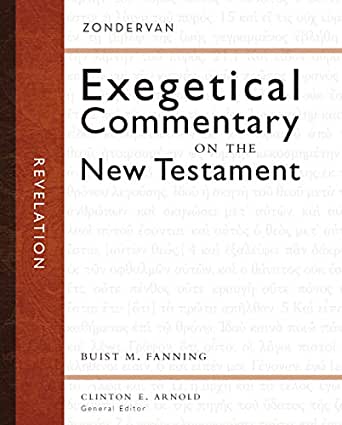
A 2020 release from a popular series
Buist Fanning is a professor at Dallas Theological Seminary. This commentary is based on a 10-year study of the Apocalypse.
Regarding the theology of Revelation, Fanning is pretribulation and premillennial. He argues that Revelation 3:10 describes the rapture of Christians, that chapters 7-19 refer to the seven-year tribulation, and that Revelation 20:1-6 — the millennial kingdom — will be fulfilled literally in the end times.
Revelation by Richard D. Phillips (REC)
Richard D. Phillips is a notable Bible scholar, pastor, and author. He has made significant contributions to the field of biblical studies, particularly in the area of preaching and pastoral ministry.
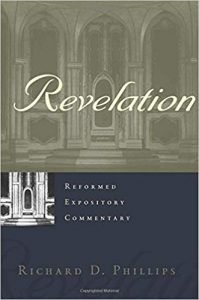
A sermon series from a popular Reformed pastor
Richard Phillips’ Revelation commentary reflects Reformed theology, consistent with REC series. It is the fruit of preaching through the last book of the Bible. He utilizes previously unpublished sermons from the late James Montgomery Boice — a friend and mentor of his — in the commentary.
Phillips interprets Revelation within the framework of evangelical theology. He is a council member of the Alliance of Confessing Evangelicals and a member of the Gospel Coalition.
Phillips is Amillennial, writing, “I wrote this commentary as one persuaded, along the lines of Hendriksen and Beale, of the redemptive-historical and Amillennial interpretation of Revelation” (p. xvi). Interestingly, Boice, Phillips’ mentor, however, was premillennial.
Revelation by Leon L. Morris (TNTC)
Leon L. Morris (1914-2006) was a highly esteemed biblical scholar and theologian known for his significant contributions to New Testament studies. He held various academic positions throughout his career, including serving as the Principal of Ridley College in Melbourne, Australia.
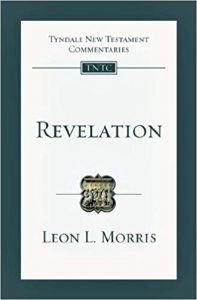
A passage-by-passage Amillennial commentary
Morris interprets Revelation within the framework of evangelical theology. Regarding the theology of Revelation, Morris’ view is Amillennial. Morris is known for writing the Luke commentary in the same series, which is considered one of the best Luke commentaries.
Revelation by Paige Patterson (NAC)
Paige Patterson is a prominent figure in Southern Baptist circles and has been involved in various roles within the Southern Baptist Convention (SBC). He has significantly contributed to evangelical Christianity, particularly in church leadership, theology, and Baptist denominational life.
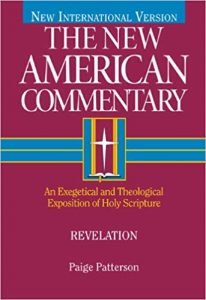
A commentary from a Southern Baptist pastor
Patterson interprets Revelation within the framework of evangelical theology. He serves in the Southern Baptist Convention. He writes: “This commentary follows the premillennial perspective” (p. 351).
Regarding the theology of Revelation, Patterson’s view is dispensational premillennialsm. He writes, “Revelation is essentially a prophecy of the end times to be fulfilled principally in the future, is the perspective that will be developed in this commentary” (p. 30).
The Revelation of Saint John by G.B. Caird
G.B. Caird (1917-1984) was a prominent British New Testament scholar and theologian. He held various academic positions throughout his career. Caird was known for his expertise in New Testament studies, particularly in the Gospels and Pauline epistles.
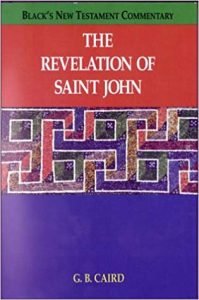
A mid-20th century classic
Caird takes a critical approach to Scripture. Tom Schreiner lists this volume as one of his recommended commentaries on Revelation, calling it “a provocative and helpful interpretation” Regarding the theology of Revelation, Caird’s view is idealist, in which the book’s symbolism applies to all times.
Revelation: Four Views by Steve Gregg (Stand Alone)
Steve Gregg is a Bible teacher, author, and commentator known for his work on the book of Revelation. He has gained recognition for his extensive study and teaching on eschatology, particularly his interpretation of the book of Revelation.
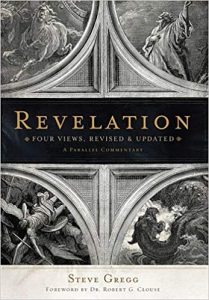
A four-view parallel commentary
Gregg presents four different views in a side-by-side commentary. The publisher notes that the “four-column format makes this an easy read for lay people, pastors, and scholars alike.”
Revelation by Ian Paul (TNTC)
Ian Paul is a respected biblical scholar, theologian, and writer, specializing in the study of the New Testament. He has made significant contributions to biblical scholarship. He teaches courses on biblical interpretation, theology, and ethics at St. John’s College, Nottingham, in the United Kingdom.

A 2018 replacement in a classic series
Ian Paul’s Revelation commentary replaces Leon Morris’ in the same series. Paul is a theologian, author, speaker, academic consultant, and Adjunct Professor at Fuller Theological Seminary. He is Associate Minister at St Nic’s in Nottingham, England.
The Message of Revelation by Michael Wilcock (BST)
Michael Wilcock (1925-2019) was a well-known British Bible scholar and author specializing in biblical commentary and exposition. He served as a pastor and preacher for many years, notably at St. Nicholas’ Church in Durham, England.
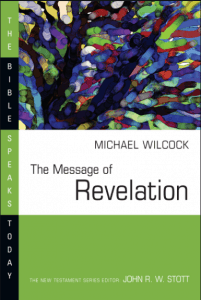
Amillennial commentary in a pastor-friendly series
The perspective of this commentary “is along amillennialist lines; and it is hoped that enough is said in the course of this exposition to commend such a view as being neither odd not unscriptural…” (p. 182). He adds: “The ‘thousand years,’ which on our view began with Christ’s first coming, are thus still in progress…” (p. 189).
Revelation by John F. Walvoord (Walvoord Prophecy Series)
John F. Walvoord (1910-2002) was a highly influential American Bible scholar, theologian, and author known for his work in eschatology, particularly dispensational premillennialism. He played a significant role in shaping and popularizing this theological framework within evangelical Christianity.
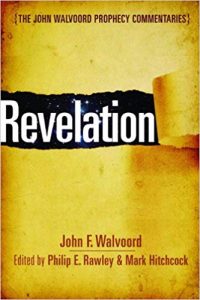
A class dispensational premillennial introduction
Walvoord writes, “Regarding Revelation 20:1-6, there is “strong evidence for chronological order in this section, and this is granted, the millennial kingdom follows the second coming as described in 19:11-16. The only reason for denying such a conclusion would be to avoid premillennialism” (p. 303).
Revelation by Ben Witherington III (NCBC)
Ben Witherington III is an American New Testament scholar, theologian, and author. He is widely recognized for his contributions to biblical studies, particularly in New Testament studies.
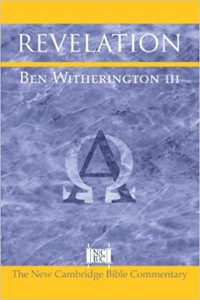
A historic premillennial approach
Witherington is an evangelical Arminian. Regarding the theology of Revelation 20, his view is historic premillennialism. Elsewhere he combines idealist, preterist, and futurist interpretations. Witherington is known for his Mark commentary in the SRC series, which is considered one of the best Mark commentaries.
| Also see |
|---|
| See the Top 50 Bible Commentary Series |
| See the Top 25 Whole-Bible Commentaries |
| See the Study Bibles Comparison Chart (over 50) |
References:
[1] New Testament Commentary Survey 7th Edition. D.A. Carson. (Link goes to Amazon.)
[2] Commentaries for Biblical Expositor’s. Jim Rosscup. p. 312. (Link goes to Amazon.
Related Questions
Is it time to take your understanding of the Gospel of Matthew to the next level? Learning and absorbing insights about the life and ministry of Jesus Christ from Matthew is worth your time and...
Consider how much wisdom and insight you would gain if you understood the book of Genesis better. Its message about God, sin, people, and redemption is inspired (2 Tim. 3:16-17) and can transform...
